War Stories

I looked at Liz-S across the bar. “Hey, is this the last day you are the bar manager?” She smiled broadly, tossing her chestnut ponytail.
“I will stay, part time, but as of Monday I am an official grown up.”
“Awesome. It is about time. You are on your way.”
Friday’s at Willow are transitional days from the perils of the working week to the full-on activities of the weekend. People tend to skip happy hour to go home and get changed for date nights or clubbing, so we had the place to ourselves. Old Jim was in Vegas with Mary, and whatever they were up to is going to have to stay there. A week without him growling at us made me feel a little lonely.
Tracey O’Grady was standing at the end of the bar, hands on the hips of her white coat. “Hey, Tracey!” I called. “What is the special today?” She has been putting items on the menu for a limited time, like the Buffalo Beef Sandwiches on kummelweck rolls.
“Gotta keep it fresh,” she said with a broad grin. “I think you will like it. I have sushi with soft-shell crab or shrimp, or some all-beef mini-wieners with pomme frites and tempura pickles.”
“Holy smokes,” I said.
“Sort of like half-smokes, yes.”
“No, I mean I never thought I would see wieners on the menu at a fine dining place,” I said.
“It is the nosh for the night,” she said, and swept off toward the kitchen.
ISCM slid into Jim’s usual chair next to me, and John-with-and-H pulled out the earbuds to his iPod. “Whaddaya think,” I asked. “Wieners or Sushi?”
Jasper grinned from across the bar. “Sushi for me. It is like back in the islands.”
ISCM said he would try the wieners, and I took a long pull from the crisp white wine.
“This is a Red Letter Day,” said John-with. He produced a slip of paper from his pocket. “I paid off my car.”
“The FX35?” I said.
He nodded. “Yep. Only 28,000 on the odometer. I am going to own it until I die. Of course they asked me if I wanted to shop for a new one and I said Hell No.”
“That is a nice raise every month, though the Infiniti people would rather have you replace it. Why aren’t you doing something to enhance the economy?”
“They will have to do it without me. That is one thing. The other is that this is the day the wheels came off the Obama Presidency.”
I snorted. “You mean the Brietbart discovery of that publishing brochure for his first book that claimed he was born in Kenya?” asked ISCM.
“I saw that. It took about fifteen minutes for the Huffington Post to change the caption on the story to reflect the spin from the White House. I bet no one pays any attention to it.”
John-with looked disappointed. “Well, it turns out that the First Birther was actually the President himself. I remember when I first heard about Monica Lewinski. I was convinced Clinton was toast.”
“You were wrong about that, and I think the media will just ignore this like they do everything.”
“I think he actually was born in Hawaii, don’t get me wrong. I think what it means is that he wasn’t thinking about the presidency at the time and thought that was an advantage to seem foreign born.”
“Oh, you mean that stuff about him getting tuition aid as a foreign student? No one cares about that stuff anymore.”
“I think they have to pay attention to it. This is huge.”
“The White House says he never even saw the blurb from the publishers, and they just had it wrong, or were hyping the foreign-born aspect on that first book.”
“It wasn’t Dreams of My Father,” said ISCM. “It was some other project about race relations that he abandoned.”
“I think this explains a lot,” said John-with.
Jon-without and the Lovely Bea came in and sat down the bar. “Wait till you see what the Friday specials are,” I said. The Lovely Bea gave me one of those smiles that lights the whole dark bar.
“I mean, it really does explain a lot,” repeated John-with. “The whole stonewalling thing.”
“I think we are sort of beyond all this,” I said. “There is enough to talk about that is really screwed up rather than rehash whether the President claimed to be a foreigner when he was a kid. He might only have been thinking about being Mayor of Chicago at the time.”
“I think it is still an issue.”
I said it was just a war story from another war that had already been fought. The ISCM looked dubious, and then smiled with the little plate with the tempura pickles, delicate French fries and lump little hot-dog on Kate Jansen’s delicate roll arrived in front of him.
“That looks fantastic,” I said, and snapped a shot of the Friday Special.
“Can we talk about something besides the presidential campaign? Something not so controversial?”
ISCM nodded. “How about chasing war criminals in Bosnia. That was interesting.”
And so we did. That, at least, was a war that was over.
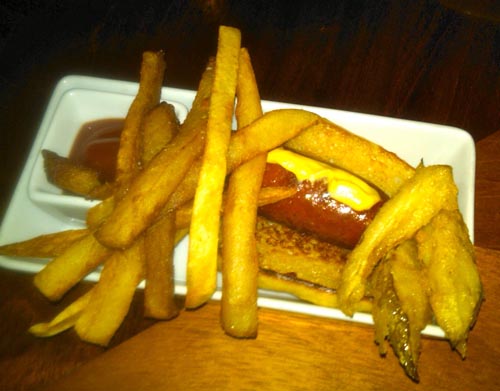
Copyright 2012 Vic Socotra
www.vicsocotra.com
Better Each Day
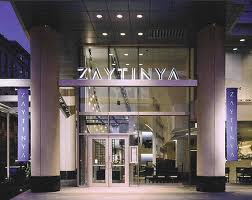
(Zaytinya Restaurant in Washington’s hip Penn Quarter neighborhood. Photo Zaytinya.)
Things are better, though slowly. Knees apparently are easy to break and hard to heal.
I stopped wearing the leg brace a couple weeks ago- and have felt marginally better with each day. The chaos and travel of closing out the house in Michigan put the idea of recuperation out of my mind altogether, that and getting a MRI to ascertain the level of permanent damage to the leg. Showers still scare me, since if the limb folded up on me I would wind up in some mass in the tub with other things broken to fit.
Funny how the world gets smaller with disability, and small things loom large. I have to make lists of things to do when I am upright. One of them included looking blankly at the screen in front of me, trying to absorb the news of the passing of Donna Summers, Queen of Disco. Donna, you poor woman. Born in 1947 and dead. Damn.
Anyway, I felt good enough yesterday morning to essay the laundry. Big PInk is Old School, with laundry rooms located two apiece on each of the eight towering stories. There was a full basket, some of the dirty stuff going back to before the trek to the old homestead. I could not pick up the basket, but discovered the smooth plastic of the container would slide along perfectly well on the Oriental rugs, so I improvised. The handle of the cane I use hooks nicely into one of the handles of the tub, and I dotted up the hallway, tugging it behind, and managed to slide it into the brightly-lit room with the two washers and two dryers and folding table.
I am not going to dwell on the challenges of picking up socks and underwear from the floor- I can do remarkable things with the cane’s handle- but suffice it to say that after finishing the cycles of ablution and carefully flying it all and dragging the suddenly neat and fresh winter-season laundry- why do I have all these clothes?- I wasn’t feeling as good as I had when the morning began.
A shower and into the office, and I was teetering a bit.
Friends from out of town were attending the big American Institute of Architecture convention at the Walter Washington Center downtown, and they had extended an invitation to dinner that night long before the minor personal disaster, and I had to calculate how to get to the Zaytinya restaurant downtown.
As you may recall, I used to work down in the office complex that sits atop the proud Art Deco façade of the old Greyhound Bus Terminal on New York Avenue, and slogged across the river each day, but it has been quite a while since I stopped while crossing the marble aggregation of the Federal City. No place to park being just one of the reasons, and the general madness of the crowds and buses another. I decided that circling endlessly to find a place at the curb and then hoofing several blocks was not going to work, so I took a cab from the Westin Hotel next to the office.
The gentleman from Sierra Leone who piloted the vehicle was listening to excerpts from the Charles Taylor trial on the radio, and we agreed that the former dictator only deserved a hole in the ground. Once across the Potomac on the 14th Street Bridge I peered out the window at the hip, young, well-dressed throng on the sidewalks. Chinatown is the hot destination now, what with the Verizon Center events and the cluster of restaurants and bars in the neighborhood.
There were throngs of conventioneers, tourists, lobbyists, legislators and bureaucrats on the sidewalks. And it was rush hour, of course, replete with Metro Transit Goliath-sized buses that rule the crosswalks and the tourist charter coaches dominating the curbs like mobile ramparts. I was in seersucker pants, blue shirt, wild bow tie and shock of white hair with the cane and white shoes. I looked like Andy Griffith in his Matlock guise, and to a casual observer, the classic Cave Dweller District denizen, even if Arlington is where I hang my hat.
Damn, I thought, I forgot my hat. This part of town is where something called “The Penn Quarter” collides with old Chinatown.
The African let me out somewhere near 8th and G Street- I wasn’t sure exactly where the restaurant was, since I did not have my bearings. I could see the former Patent Office where Walt Whitman had been a nurse during the Civil War, and is now the spectacularly refurbished Portrait Gallery of the Smithsonian. I thought the numbers must go up, and headed toward 9th Street. I pecked my way up a block and across the street to the restaurant: it was gleaming new, soaring ceiling, and apparently featured Mediterranean cuisine.
Bonds n’ Donna were waiting inside the door, and there were tales and catching up at the table. Liza (with Z) was our server and she explained the deal: the food is Greek, Lebanese and Turkish in origin, envisioned by Executive chef José Andrés. “Though the plates are small, each is supposed to be shared. We think the sharing encourages conversation, and allows everyone to sample a wider variety of spreads, cheeses, vegetable, meat, poultry and seafood.”
The bread and olive oil dip alone was to die for, though of course I was not willing to do so literally.
It was still broad daylight when we were done. I managed to get down the marble steps without falling. I did not introduce myself to the cabby on the way back, Bonds stepped into the street to hail a cab, and and it was the sort of day that caused a taxi to swerve to the curb as soon as his hand went up. and the dusk was just settling in when I plopped down on the comfy brown chair in the living room of my little flat.
Anyway, it was one of those fine days in DC, and I had completely forgotten what a curious, energetic, astonishing city this is.
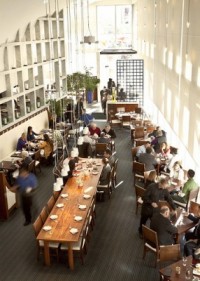
(We dined at the table at the extreme lower right hand corner. Photo Zaytinya.)
Copyright 2012 Vic Socotra
www.vicsocotra.com
Blood on Brown Water
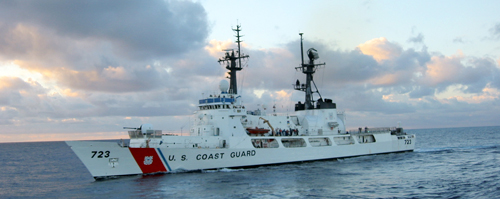
U.S. Coast Guard Cutter RUSH (WHEC-723)
It was getting on time to get out of Willow and navigate home. I have some sort of an internal meter that tells me when to go, and Boats was traveling by train to get back to his digs in Annapolis.
I held my palm over the top of my glass as Liz-s came by with a bottle of Barn Burner White. “No mas,” I said. “I don’t want to hit a bridge on the way home. We can work with the check when you get a chance.”
The disengagement process at Willow can be a slow process, and the place was still jumping. “We sold 34 beef-n-weck sandwiches so far,” she said, pursing her lips and blowing a wisp of her chestnut hair out of her eye. Tracey said she might put it on the menu as a regular item.”
“It was mighty fine,” said Ray. “But I think I need to get on the Metro and head back.”
Jim had creaked to his feet, saying he had to pack for the big trip to Vegas with his wife Mary. “Don’t do anything I wouldn’t do while I am gone,” he growled, producing his fierce bulldog-headed cane from the hooks under the bar.
“I can’t imagine what that might include,” said Jon-without, looking mildly puzzled. That is one of his most effective looks. “And I suppose I should go home and work on my PowerPoint presentation on energy and water. I have to give it to a visiting delegation from Ecuador next week.”
We waved as they exited the tall glass doors to the patio and the Amen Corner started to empty for the evening. I don’t know who shows up after we are gone, so it was mildly interesting t see the dark bar filling up with younger people.
“It is a great bar,” said Boats gesturing broadly at the dark woods and the rows of neatly organized bottles in back of Liz-S. “I am glad I came. Now, you have to come to the Fleet Reserve Club in Annapolis. That is living. You will feel right at home.”
“I would like to,” I said. “It is a wonderful town. And thanks for the run-down on the Jones Act. I had no idea how complex this was, or what the legislative authority is that governs the work-rules for the people who are working out there on America’s waterways.”
“It is my quest, now that I am out of the government again,” he said, pointing at the buff-colored volumes on the bar. “If you go to the Chapter in Blood on Brown Water titled “America’s Invisible Merchant Marine Fleet you will see the cost in human terms. Me, I have the papers to serve as an unlimited tonnage Master and First Class Pilot.”
“Could you be making a half million a year like those pilots in San Francisco Bay?”
“If Ii had more friends in Sacramento, I might. But there are some things that are more important than cash. Like I said, I have a foot in both worlds- the one of big container ships and the smaller ones. Most of the members of the “Jones Act Fleet” are less than 1,600 gross tons fully laden.”
“I don’t feel comfortable on anything smaller than 90,000 tons,” I said, polishing off the dregs in my glass. “1,600 is only half the size of a Coast Guard High Endurance Cutter, right?”
Boats nodded. “There are Jones Act vessels of much greater size, but they tend to have unions and less of the “Third World” working conditions. That is what I am trying to get Congress to wake up to. It is inhumane and dangerous to navigation.”
“I imagine crew size is the big deal,” I said, putting my wallet on the bar. “My treat, since you traveled so far. A buddy of mine was a surface warfare officer before he wised up and applied for lateral transfer to intelligence. His first ship was a Spruance-class destroyer. When they set the special sea and anchor detail to enter port they would have more than a dozen people on the bridge, including the captain, navigator, the ODD, JOOD and the pilot. There would be another large team in CIC doing radar navigation.”
“Exactly my point. Most people think of the merchant marine as a bunch of deep-draft transports, freighters, container ships and break-bulk container ships. Actually, it is completely the reverse. Most of the ships are tugs, barges and offshore service and supply vessels. That is where there might be only one guy on the bridge, and his unregulated shift might be twenty hours long without hot chow.”
“That sucks. The Navy can be pretty crazy: combat operations mean a lot of sleep deprivation. It is deadly earnest.”
“When you consider that our merchant sailors on Jones Act ships are steaming in peacetime, it ought to make people sit up and realize why there is blood on the water. The working conditions are harsh on the smaller ships, particularly for older sailors. The ships are chronically under-manned, most have crewmen aboard who are too junior to stand watches by themselves. Think of the stress of operating the ship in bad weather and at night. That doesn’t include the crappy diet and contaminated water from old tanks, second hand smoke and constant interruption of sleep.”
“Why do people do it?” I asked as Liz-S slipped the black folder with the bill in front of me. I fished in the wallet for some greenbacks and Boats pointed at it.
“People have to work, and once the brown water is in your veins you can’t get rid of it. But you should not have to die because you love your work.”
“I am on board with that. What can we do about it?”
“Write your congressmen,” said Boats. “We have to start somewhere or there will be more blood spilled in what ought to be the safest merchant marine in the world.”
“Who writes the rules?” I asked.
“The House Coast Guard and Maritime Transportation Subcommittee and the Senate Commerce, Science and Transportation Committee,” he said. “We have got to get through to them. There aren’t many of us Master Chief Boatswain’s mates left to speak out for the merchant sailors.”
I slid off the stool, waiting for the sharp stab from my knee to abate. “I will do what I can, Boats. This was fun. We ought to do it again.”
Boats smiled. “Yeah, it was. Great food. It was interesting to see all these characters I read about every day and realize they are real flesh and blood.”
“It is sort of a reality show,” I said, planting my weight on the cane. “The good kind, with excellent wine.” I waved goodnight to Jasper and Liz-S. “See you Monday, guys!” I called.
Boats leaned forward: “A last word about what is at stake. Not only are American Merchant Seamen dying and bridges being hit dropping civilians into the water but the entire Coast Guard marine safety mission is at risk. I’m the last office holder in the maritime labor movement who thinks that the Coast Guard marine safety mission is worth saving. I don’t believe that the USCG does this mission very well, but I’ve seen first hand how the effort goes hand-in-hand with the port and waterways security mission.”
“I will write my congressman and Senators,” I said. “The transportation bill is still being debated isn’t it?”
Boats looked grim. “If I fail at getting the Congress to act on the NMA’s Second request to Congress before I accept a different job or just actually retire in fact, there will be a full court press by labor to toss the Coast Guard out of the Marine safety business.”
“That is the sort of deregulation that could be a catastrophe,” I said, hobbling toward the door. Boats tugged it open and we walked out onto the steps leading down to the patio.
“The Coast Guard has treated the limited tonnage Jones Act seamen like dirt, and they’ re mad as hell and not going to take it anymore. Now that you know the work rules are killing merchant sailors, we ought to talk about port security, and some things the bad guys have been thinking about doing to us.”
“You are a man on a mission, Boats.”
“You better believe it. Don’t piss off the Master Chief.”
“Roger that,” I said, and he walked briskly off toward the Metro, and I hobbled toward the Bluesmobile and into the night.
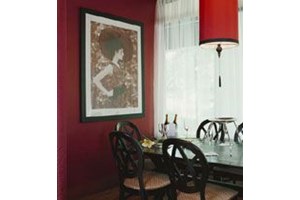
Copyright 2012 Vic Socotra
www.vicsocotra.com
The Wet Side of the Levee
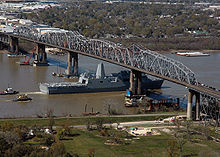
(USS New Orlean passes under the Huey P. Long Bridge north of New Orleans, LA. Photo USCG.)
The crowd was transitioning from Happy Hour to something later at the Willow Bar. The regulars were getting topped up, and the more casual patrons were cycling toward the dining room or back to their homes. I was talking to Boats, a retired Master Chief Boatswain’s Mate, U.S. Coast Guard Reserve. He has a carefully groomed short beard and an intense gaze. He is a passionate Cajun, and he is in tune with a world that is alien to me, and I spent the better part of three decades afloat or ashore waiting to go back.
I studied the pale yellow beverage in my tulip glass. Death Junior’s place had been filled to my left by Jon-no-H. Old Jim was working steadily through his daily allotment of Budweisers. John-with-and-H was next to me, talking about the LightSquared bankruptcy. He is a political operative, regardless of his place in the Executive Branch, and a bit of a duck out of water at the moment. He seemed to think LightSquared was another example of failed crony capitalism, and I tended to agree.
“Their wireless technology interferes with the Global Positioning System,” I said. “They had a waiver from the FCC only to prove that it didn’t. It did. Even the Chief of Staff of the Air Force said so. Courageous.”
“Yeah, imagine the navigation system on your car offset your position by a few dozen yards because somebody needed to talk to their girlfriend.”
“And hit a bridge,” I said grimly.
Boats spoke up. “That is what I am trying to tell you. You are concerned about a threat to land navigation, and you are just demonstrating that you are increasingly divorced from real life on the original highways of America- the rivers and inshore waterways.”
“I imagine it is like looking out from a train at the back-of-the-house of any big city,” I said. “No one rides trains anymore.”
“The American public doesn’t see it, and if you can’t see it- like from the bridge of a tow-boat on a black ass night- you can’t believe there is even a problem.
“The security of our maritime infrastructure is a big problem,” I said. “Before I retired from government we looked at what would happen if terrorists got the big Liquefied Natural Gas manifold in Boston Harbor. The city would have been toasted in the blast.”
“I agree that is a big issue, but I am more concerned about the working conditions for American mariners. That is an issue that is pressing every time our 125,000 mariners get underway. Every day of the year.”
“I thought you said it was the Jones Act that mandated the conditions,” I said querulously.
Boats sighed. “Let me take it again from the top, Vic. The Jones Act doesn’t mandate things like the two-watch system. The regulations in Title 46 Code of Federal Regulations allow it as an option, even if it an option that nearly all Jones Act vessel owners take up.”
“So, permitted but not mandated, right?”
Boats shook his head in affirmation. “I think I could do another one of those sandwiches. “And remember, the National Mariners Association is not fighting the Jones Act, we are trying to “tighten it up” along with the associated regulations. We are a “limited-tonnage” merchant mariner advocacy and watchdog group.”
“Lobbyists?” I asked. “That is a dirty word these days.”
“No we are not,” he said primly. “We engage in the political process, primarily at the national level, to improve the safety, health and social stability of our mariners.” He asked Liz-S for another sandwich, which were flying out of the kitchen and landing up and down the Willow bar. He turned back to me, saying: “The NMA is not a union. We do not organize workers within companies, or engage in collective bargaining. That is up to organized labor. We do not compete with unions, but we do our best to support them.”
“So where is the Coast Guard in all this?” I asked. “I heard one operator say that the only person who is going to rescue you is another Mariner. The Coast Guard will show up on the dock right after the television cameras.”
“Labor can’t stand the way the Coast Guard administers what the government now calls “the Merchant Mariner credentialing system.”
“I am not surprised. I heard one guy was getting ready to take a trip down the river and discovered that the government had a wrong address on file and had sent him a letter demanding a cardiac stress test. The guy never got the letter, and they yanked his papers.”
“Well, would you want a cardiac case alone at the helm with the piers of the Huey Long Bridge dead ahead?”
“I understand. But did you hear that the professional pilots who bring the big ships into San Francisco Bay are making $450,000 a year? That seems crazy.”
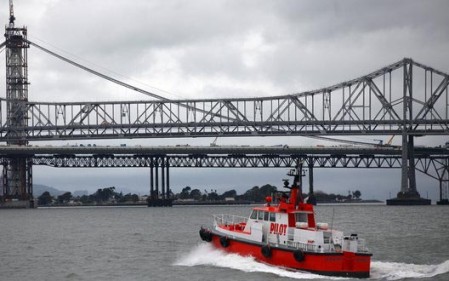
Boats scowled. “Those pilots- they call them “bar pilots” because of the treacherous sand bar in the approach to the Golden Gate have been at work since before the Gold Rush. They are regulated by the state, by the way, and they have managed to restrict their guild to a total of less than sixty licensed pilots. A bill that would have increased piloting rates and wages was soundly defeated last year in Sacramento.”
“I never heard of that, and I have been on big ships that pulled into the Bay. I might have seen the pilot come aboard.”
Boats nodded. “It is not a cushy job even if the pay is good. The Bar Pilots board the big ships twelve miles out, and part of the hazard of the trade is getting from the pilot boat onto the bug ships. It is dangerous. But that shows you how little the public knows about all this. They are an obscure group of workers, overseen by an even more obscure state commission. They blipped on the radar screen because of the California budget catastrophe. They were accused essentially of fraud, waste and abuse because of their compensation and the fact that they ruffled feathers by flying business class from SFO to France for training.”
“I could use some quality training,” I said, taking a sip of white. “I hate flying pretzel class.”
“It is all a labor and profits issue. The pilots say they are being vilified in a well-orchestrated campaign by ship-owners. They say they are asking for the rate increase only to ensure the safety of Northern California’s harbors as they pilot bigger and bigger ships.”
“Wait, is this all out of control?” growled Old Jim. “Why doesn’t the Coast Guard do something about the situation. Don’t they have responsibility for the marine safety?”
“Everyone is unhappy with the situation. Labor and Management feel the system is unnecessarily complex, convoluted, expensive and lacking in common sense. The credentialing process for mariners certainly contributes to the shortage of mariners, but labor feels that management’s callous attitude towards working conditions is the primary cause for the labor shortage.”
“And everyone blames the cop on the beat, right?”
Boats nodded solemnly. “Management wants to lay all of the blame at the feet of the Coast Guard. Labor wants the Coast Guard out of the marine regulatory business but management is afraid of OSHA and clings to the USCG as the arbiter of choice. Labor views the situation as rigged by management, which has contributed to the appalling working conditions that endanger your safety.”
“What?” I sputtered into my wine. “How does this affect me?”
“How about you happen to be driving across the Chesapeake Bay Bridge and a mariner who has been awake for twenty hours falls asleep and takes out a pier just as you get there.”
“Crap. That would be bad,” I said, thinking of riding the Bluesmobile a couple hundred feet down to the brown waters of the Bay. “And think what that would do to beach traffic.”
“Yeah, for months. This is going on in navigable waters all over the country. The DHS Inspector General’s Office of Audits is on the case, and they think that marine accidents are way under-reported. The NMA has known for years that only a tiny fraction of towboat and offshore supply boat industry accidents are reported to the Coast Guard. It verges on anarchy n the other side of the levee at times.”
“Is this real or political?” I said, looking at a spectacular blonde woman on the arm of someone who I realized was actually former Speaker Newt Gingrich.
“Real as a heart attack. The marine safety mission is funded on skewed data picturing an industry that is much less safe than what the Coast Guard’s pictures to Congress.” Boats gestured at the bound reports on the bar in front of me. “That is the real story. The fat one has the complete real picture of what is happening on the wet side of the levee. The thinner one is called “BLOOD ON BROWN WATER ,” and is written so simply that even Navy Squids can understand it.”
“Considering I had never heard of the Jones Act before I came here for a beef-and-weck sandwich, I will not take excessive umbrage,” I said owlishly. “Though I do think that I have had enough happy Hour White for one evening. I don’t want to hit a bridge on the way home.”
Boats tossed his card on top of the two buff volumes on the bar. “Check it out,” he said. “You might learn something about what is going happening on the wet side of the levee.”
Copyright 2012 Vic Socotra
www.vicsocotra.com
Want to know more? Check the MNA site at:
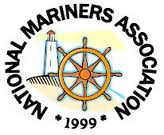
The Association
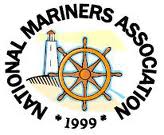
“So, the Jones Act is killing merchant sailors? How is that? And how come the market doesn’t take care of those labor issues?”
Boats grimaced and pushed the wreckage of his beef-on-weck sandwich toward the side of the bar where Jasper and Liz-S were working. It is a little poignant; Liz-S got dressed up in her lawyer suit and scored a paid internship with the Inspector General of the National Association of Associations down the street.
Jasper smirked when I asked him if things would be harder for him once she was on our side of the bar. “Nah, I will just get more hours. I can work as much as Tracey needs. I like it.”
“I want fewer hours, or at least a couple fewer jobs,” I said with a sigh. “I had a retired FBI Special Agent come and visit me when I got back from Michigan,” I said. “He was doing what I fervently hope is my last five-year background investigation.”
“You think you are going to retire? I am not sure anyone can ever retire anymore. We will stay in the harness until we drop.”
Old Jim snorted. “Not me. You have to work the angles.”
“And have a wife who is still working,” I said.
“Screw you,” he said thoughtfully, and took a deep draft of his Budweiser. “I bet you that Special Agent works exactly as much as he wants and then takes vacations.”
Jon-Without finished his Sodoku and gave a whoop of satisfaction. No one looks better doing number puzzles at the bar than Jon-without.
Senior Executive Jeff and his son were chowing down on the new fish and chips, which doesn’t look like the tempura fantasy anymore, but more like…well, fish and chips. Jerry-the-Barrister was eating tuna sliders next to me.
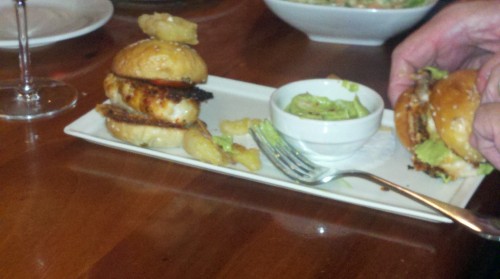
“So this guy is asking me about the little unpleasantness that happened in Aurora, Colorado, in 1977. I am getting tired of hearing about that night every five years. But anyway, he starts off on a thing about Recreational Vehicles. He swore by his Class A RV- a full-out motor-coach, with satellite internet and television and a king-sized bed.”
“I can just see you on the highway in one of those, Vic. King of the Road,” said Jon-without.
“Hey, he said the $200K price for a nice Class A is a mortgage write-off, he can use it as an office for his investigation business, so that is a write-off, too, and it can go wherever he wants in the south in the winter.
“Sounds like an unsinkable boat,” said Jim.
“I have really been trying to crack the code on where to go in the winters once I am not working. Oh, he says the price means the places these things show up are not filled with trailer-trash. I see them parked for the winter on the beach at the Dam Neck Navy Base and sit and drink wine from the Class Six store and watch the surf….”
“Yeah, but you would still be on the highway,” said Boats. “What is happening out there on the roads is like what is happening on the waterways. With all the oil exploration, there are thousands more accidents in the trucking business that supports the activity in the oilfields. Fatalities have gone up almost twenty percent since the middle of the last decade. Shifts are longer, more inexperienced workers are being hired and older rigs are being pulled out of mothballs to exploit the fracking technology. More people are dying on the roads and in the fields.”
Boats nodded. “Not surprising. People want jobs and they want a paycheck, and they will take chances to get them. They will try to regulate that out of Washington, I imagine. That is what the National Mariners Association is trying to get in changes to the watch bill, among other things.”
“Unless changes are made to increase worker safety, the high fatality rates will be fact of life out there in Western Pennsylvania and in the west. A buddy of mine just came back from South Dakota, and he said there were gigantic trucks everywhere.”
“Well,” said boats, fortifying himself with a sip of crisp happy Hour White, “imagine the same thing happening on America’s original superhighway system. You landlubbers don’t see what is happing out there on the great rivers. It is still far cheaper to tow big barges with cargo that it is to load them on a railcar or haul over the rods. The merchant sailors are the life blood of commerce on the waters, and we are killing them.”
“That is the problem with the merchant sailors,” said Boats. “In any for-profit situation, the owners will try to exploit the situation. With the credentialing of crewmen, there is a finite pool of sailors on which to draw. The two-watch system mandated under the Jones Act have the crews on the tow-boats working port-and-starboard watches. They fall asleep and accidents happen. Working around the clock for a career kills your body rhythm. I can’t tell you the number of merchant sailors I know that died in their fifties. It is just not a sustainable system.”
“I hated standing watch in the Navy,” I said. “It screws up your body. I am glad I only had to do it for three years full time.”
“Well, yeah. The Association represents 120,000 American professionals who stand watch for a career. Here is some of what is going on: crew sizes are plummeting to chase profits. Human beings are expensive, so billets for cooks are going away. That means a guy on watch has to eat whatever he can get from the galley. Fast food or cold cuts. No vegetables or anything healthy. That is just one aspect of the problem. Body clock issues can contribute to crewmen falling asleep on watch and crashing into bridges or other barges. It is a crisis.”
“So, you left the Government to go fight the Jones Act?”
“Not all of it. The point of legislating the rules of the road is to protect American industry in ship-building and commerce. But when it comes to work-rules, we need to update ‘em to protect a precious national resource. I wonder if I should try another one of those sandwiches. Those are pretty good for up-north food.”
“Tracey is thinking about putting it on the menu as a special once a month.”
Boats seemed to support the idea, as did the rest of The Amen Corner. “Is there any chance Kate Jansen would sell the kummelweck rolls? “ I asked. “I would buy some to freeze. That pretzel salt and caraway seed crust is to die for. Kate burshes them with egg white to keep the coating in place. Fluffy and tasty.”
“That’s a great idea,” growled Old Jim. “But what would you put in them?”
“Cold cuts or cheese,” I said. “That would be all right straight from the galley.”
“It would be a lot better if you had a two-man watch,” said Boats. “And I guarantee the sandwiches would be better.”
“That is an association I would be happy to join,” I said.
“We are just asserting our right to petition the government for the redress of grievances,” said Boats.
“Right on,” I said. “And ask for another glass of wine.” I waved hopefully at Liz-S down the bar. Life without hope ain’t worth it.
Copyright 2012 Vic Socotra
www.vicsocotra.com
Cabotage
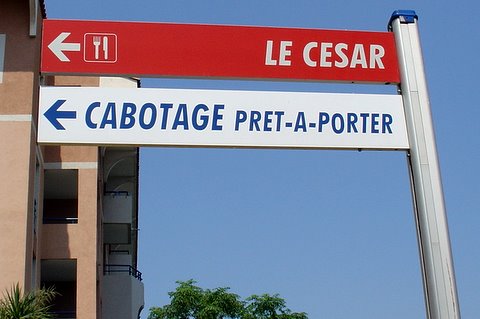
“It is necessary for the national defense and for the proper growth of its foreign and domestic commerce that the United States shall have a merchant marine of the best equipped and most suitable types of vessels sufficient to carry the greater portion of its commerce and serve as a naval or military auxiliary in time of war or national emergency, ultimately to be owned and operated privately by citizens of the United States; and it is declared to be the policy of the United States to do whatever may be necessary to develop and encourage the maintenance of such a merchant marine, and, in so far as may not be inconsistent with the express provisions of this Act, the Secretary of Transportation shall, in the disposition of vessels and shipping property as hereinafter provided, in the making of rules and regulations, and in the administration of the shipping laws keep always in view this purpose and object as the primary end to be attained.”
— Sec. 1. Purpose and policy of United States (46 App. U.S.C. 861 (2002))
If you are like me, you don’t spend a lot of time worrying about the inland and near-coastal waters of this great Republic. I think we probably should, but it is a dense subject, as you can tell from the above excerpt from the US Code more popularly known as “the Jones Act.”
That is the burr under the saddle for Boats these days, if I can be permitted an equine reference. He is a freak of nature, an educated boatswain’s mate. Actually, that is not fair either to nature or the tribe of Deck Apes for whom the Master Chief sits at the right hand of God.
Actually, I have no idea why Boats and his rate-mates enjoy lampooning themselves and playing to stereotype. As I mentioned the other day, the Master Chief is a retired reserve Coast Guardsman and professional expert witness on all manner of minutia involved with Admiralty law.
“I think we have more showman in us than professional ego,” he said, pushing two wire-bound volumes across the dark wood of the Willow bar. Death Junior was standing next to me, between me and Old Jim, downing the first of the two Old Fashioned cocktails to which she limits herself after a spent day with the dead.
DJ was filling me in on the latest gossip from Murphy’s Funeral Parlor, the plans for her wedding next year, and the relation between this world and the next.
Boats was polishing off the last of his beef-on-weck sandwich. “I had no idea that non-Cajuns can cook this well,” he said, dabbing his lips with one of the Willow napkins on which I scribble notes. He looked contemplative. “Probably a better job on roast beef than my Mom could do; and that’s about the highest culinary mark a Cajun can give.”
“You can never go wrong with Tracey O’Grady in the kitchen,” I said. “Willow may be the only reason I don’t climb in the Bluesmobile and flee this crazy land of Oz for good.”
“I strongly recommend you look through these two books,” he said, gesturing at the buff cover of the one on top. It was emblazoned with the logo of the National Mariners Association, a lighthouse and ship’s wheel on a littoral shore.
“Abuse of Mariners Under the Two Watch System?” I asked. “Is that the Jones Act? You can’t blame me for being confused. Every time those chuckleheads downtown pass a law they have to figure out some platitude for the title that evokes kittens and Motherhood.”
“I am surprised the Coast Guard Appropriation is not called ‘the Keeping Your Kids Safe On the Water’ bill. What I call the Jones Act is shorthand for public law 66-261, the Merchant Marine Act of 1920 as amended.”
“My head is starting to hurt, Boats. What has that got to do with the two-watch system?”
“It is part of the whole scheme to deal with cabotage.” Boats pursed his lips and examined his glass of white wine.
“Cabotage?” I said dubiously.
“Yes, exactly. Cabotage is coastal shipping. The Act requires that all goods transported by water between U.S. ports must be carried in U.S.-flag ships, constructed in the United States, owned by U.S. citizens, and crewed by U.S. citizens and U.S. permanent residents.”
“I remember that part from when I worked in Navy legislative affairs,” I said. “Every session, the first bill that went in the hopper was from some crusty old southern Congressman who wanted us to bring the Midway back from Japan to do any maintenance work. That would defeat the whole point of having a forward-deployed carrier and be expensive as shit. But we don’t build many ships in America any more. No one wants to comply with the law.”
Boats nodded. “Exactly. Now, I am not trying to attack the “Jones Act”, I’m trying to defend it. It needs some adjustments, though. I am launching a full scale assault on the continuing abuse of American Merchant Mariners who are being made to work under third-world conditions.”
“That is pretty technical stuff,” I said. “How are you going to sell the concept?”
Boats signaled toward Liz-S for more wine, and appeared to be considering the weighty matter of another sandwich.
“I imagine this is going to get pretty complex,” I said.
“I am going to make it simple for you,” he said as Liz-S appeared with a bottle of un-bubbly. “But it is going to take a minute.”
“I’m done,” said Death Junior, and reached for her purse to pay her tab.
I pointed at my glass and winked at Liz-S. “In for a penny, in for a pound. I am all ears, Boats.”
And that is where he started the story about mariners, shifts and safety really begins. Unfortunately, I will have to get to that tomorrow. Work stands between me and the rest of the story- and a visit with Liz-S later.
Copyright 2012 Vic Socotra
www.vicscotra.com
Dinner at Willow
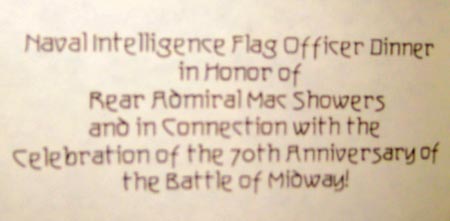
It was a glittering affair from the secret world at Willow last night. The second-to-last Director of Naval Intelligence thought it would be a good idea to honor our iconic Mac with a dinner. The attendees were a select bunch (except for me) and the list was restricted to active and retired flag officers and their spouses.
The venue was Willow, which was at its Saturday-night Date Night elegant best. Tracey O’Grady had worked with Tony’s wife Beth to produce a limited but select menu featuring vegetarian, surf and turf options with salad and appetizer courses. There was dedicated bar service in the larger of the private dining rooms in the back. Liz-S had the front bar, and she was kind enough to walk me back and usher me into the room. There was an attractive rack of cheeses, hard and soft to be served with Kate Jansen’s marvelous cranberry biscotti di Prato and cantuccini.
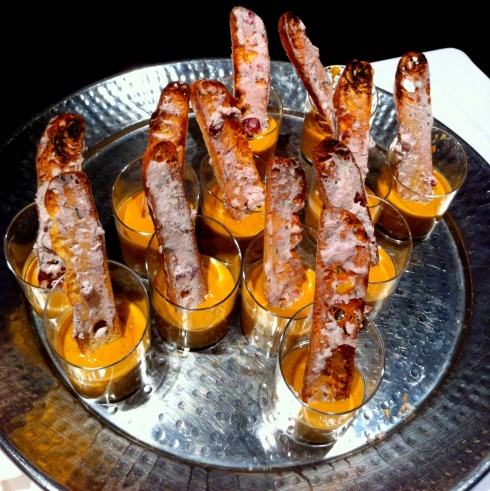
Her take on the traditional Roman twice-baked delicacy combined the sweet tartness of the fruit with the warm rich creamy taste of the soft cheeses. Pliny the Elder boasted long ago that biscotti “would be edible for centuries,” and were the staple of Rome’s Legions. That may be true, but Kate’s were brand new, crisp and crusty.
They were delightful when combined with the chilled white wine. It was not the usual Happy Hour White I sip at the Amen Corner up front during the week.
The room filled rapidly with familiar faces- this was a crowd accustomed to precision timing and appearance.
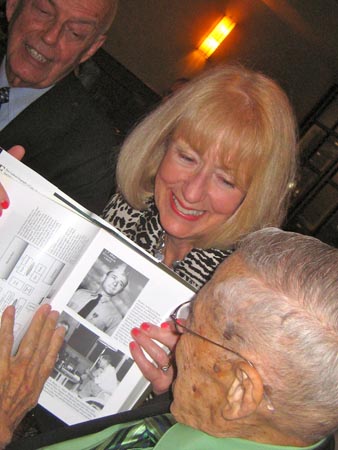
(Ann and Mac examine a copy of Joe Rochefort’s War with his wartime picture commemorating his award of the Bronze Star by FADM Chester Nimitz).
I found Mac holding court- signing books and talking with one of our four-star officers (the first Intelligence officer in DoD who made that rank. Our other full admiral was there as well, as were their lovely spouses. I marveled at the crowd- I lost count of the number of former Directors of Naval Intelligence present, stopping at seven, and the officer who serve in positions of great authority since the big reorganization. Directors of the National Security Agency- there were three present- and a couple Directors of DIA chatting one another up.
The former Director of National Intelligence was there and at his folksy best. There was some confidential business being done along the edges of the crowd, and a little casual mentoring from the retired to the newly selected flag officers, but for the most part the dialogue was breezy and intimate with shared experiences, duty stations and crises current and past.
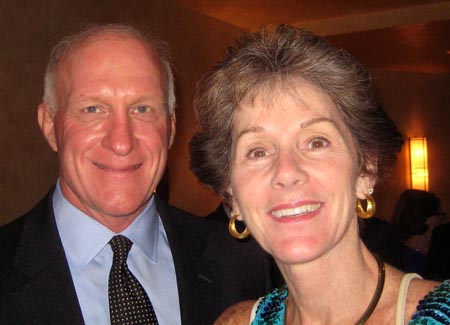
(Rick and Jodie)
It was delightful to see them all, the greats of the trade and those still with the horsepower to scale similar heights. I was fortunate enough to be seated next to the Director of Intelligence for The Joint Staff, who is one of my favorite officers, daughter of a legendary four-star Admiral and grand-daughter of another DNI.
After a delightful social hour, Tony called the crowd to order and the crowd sorted itself out with nary an Executive Assistant or harried young Looper to in sight to make things work effortlessly, but that was the point. This was a gathering of men and women who make history- and those who will make it in the future.
I was fortunate enough to be seated between Mac and the Director of Intelligence for The Joint Staff, and across from a man who had once been nominated to be Secretary of Defense and his lovely wife Nancy.
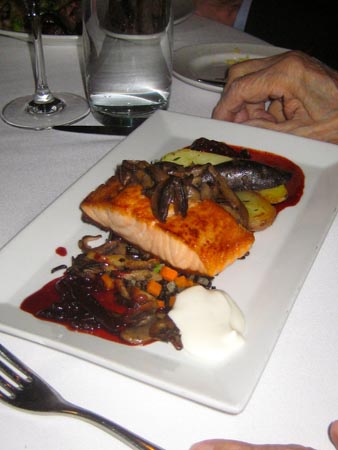
(Mac’s salmon. He ate half and took most home for his “dog.”)
The asparagus appetizer looked appealing, but I went with the classic Willow Caesar salad, followed by another appetizer and the vegetarian main course. As we dined, three Toms, Mike, Tony, Rick and Sam rose to make brief remarks about Mac and his place in history.
After all, Mac was there at the birth of the national intelligence community, the last officer remaining of the trail-blazing team who cracked the Japanese codes, analyzed the facts, assessed the best course to victory, and convinced leaders like Chester Nimitz to issue bold and decisive orders. Sam pinned the warfare device on Mac’s lapel to a round of congratulatory applause.
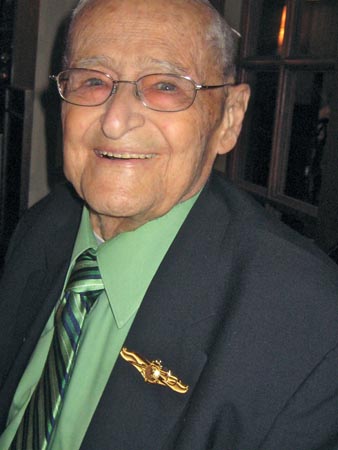
(Mac with his warfare pin signifying mastery of the intelligence trade.)
Mac basked in the attention, the first of these commemorations in honor of the 70th anniversary of the battle of Midway.
I had anticipated an early evening- this is a busy crowd, after all, but the wine flowed with dinner and the remarks were engaging, as was the table talk at the six round tables. The service was Willowesque- solicitous but unobtrusive, and at length I was surprised to glance at my watch and see the hands approaching eleven. Sam presented Mac with the gold warfare pin that signifies the mastery of the Intelligence trade, and the group gathered for a group picture. I did not bother to try to count the number of stars the aggregation represented.
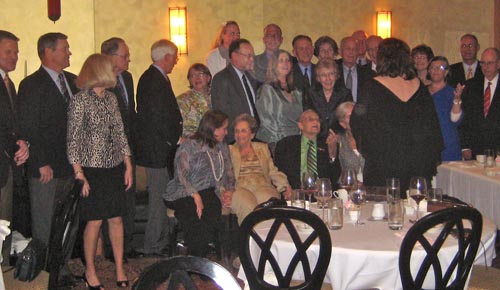
(More stars in this shot than I could count.)
I stopped to talk to Liz-S on the way out and had a glass of her white as a nightcap with Tony and Beth.
“Great event,” I said. “You are fantastic to have arranged this. And it is nothing short of amazing that Mac is here to share it, and remind us that seventy years have passed but it is still like yesterday to him. You know they want him to make four speeches in Honolulu next month?”
Tony took a sip of single malt Scotch. “No one else in the world is better to do it,” he said. “He is history, ambassador of the past to the future.”
When our drinks were done, we bade Liz-S a peaceful Mother’s Day, and walked out the front door and into the darkness of a wonderful, soft May evening.
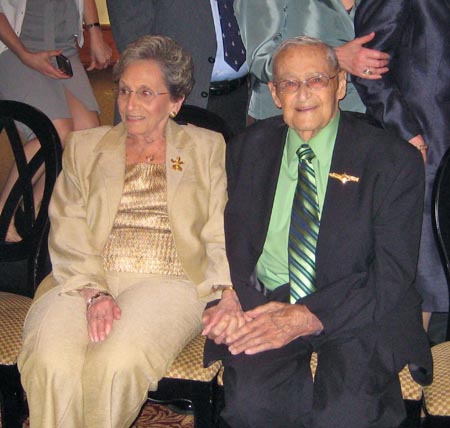
(Mac and Jimmie)
Copyright 2012 Vic Socotra
www.vicsocotra.com
The Jones Act
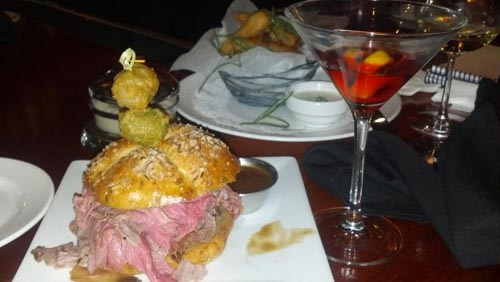
(Beef-on-weck alongside a Buffalo-tini made with Gray Goose Vodka and loganberry ice provided by Jon-no-h. Photo courtesy The Lovely Bea.)
My son drove me out to Suitland for the “pinning” ceremony yesterday morning, since I am still gimping along and needed to take the Hubrismobile into the dealer, located near his apartment. He picked me up there and we drove across the busy morning Washington to the Office of Naval Intelligence, where Nimitz OPINTEL Center commander tacked the warfare device of the Information Dominance Corps on my son’s left breast.
It was a very moving ceremony, and frankly choked me up. He rolled me back into the city when it was done, down the Suitland Parkway and past all the construction on the east side of the Anacostia where the highways are in chaos and the enormous sprawling campus of the new national security state is rising on what was the grounds of St. Elizabeth-with-a-Z Asylum for the Insane.
Not that there is any overt connection between the old institution and the new one, but I have my suspicions.
He dropped me back at the office where there was a daunting stack of papers on which to labor. Before he roared off I offered to buy him dinner to celebrate when the day was done. It was a matter of some anticipation amongst the regulars at The Amen Corner of the Willow Bar.
Tracey O’Grady had been talking about doing “Beef on Weck” sandwiches for the Friday special. The creation is a Buffalo, NY, favorite. In point of fact, some people consider the thinly sliced rare roast beef (piled high as 6 inches) on a freshly-baked kummelweck roll the best roast beef sandwich in America. Few, if any, restaurants outside the Buffalo area serve this unique regional delicacy. Or know what it is, or that matter.
It is the kummelweck roll that makes the sandwich unique, crusted with rough pretzel salt and caraway seeds. Tracey’s business partner (and mistress of all baked things) Kate Jansen did the rolls from scratch in the Willow ovens.
The beef came from a cow who was raised on grass in the Shenandoah Valley, and specially ordered this week. On the side was a basket of Willow’s magnificent fries with two dipping sauces: creamy horseradish rich brown gravy. Not a drop of catsup in sight.
It is a little sad. The beef-on-weck is a dying institution. The history of the sandwich goes back to the turn of the previous century, when Lakes cities like Buffalo and Toledo and Detroit were roaring centers of commerce.
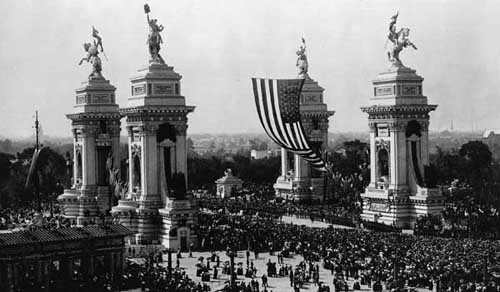
(Crowds throng the 1901 Buffalo Pan-American Exposition.)
Buffalo was the site of the 1901 Pan American Exposition. In anticipation of the throngs of attendants, a local man named Joe Gohn purchased a small saloon that he named “Delaware House.” It was a strategic purchase- the tavern was located across the street from one of the main entrances to the Exposition. He enlarged the building to offer lodging for tourists. Delaware House was never really a hotel, but in order to sell whiskey, Joe had to have ten bedrooms and sitting rooms for prospective guests.
There were some VERY small rooms at taverns in those days.
Trolley cars let of streams of people right in front of Delaware House, and Joe decided that a roast beef sandwich washed down with icy-cold beer would be just what the crowd would need, away form the sludge sold on the Midway of the Exposition. Joe had a German baker working for him, possibly named William Wahr, who suggested adding the caraway seeds and salt to the top of the Kaiser rolls he baked as they did back home.
In Germany, this type of roll was called a kummelweck, efficiently truncated in Buffalo’s argot to “weck.”These sandwiches soon became very popular, and of course, the salt and horseradish dressing on the kummelweck helped to parch the palates of the thirsty patrons and moved a lot of beer. There ain’t so such thing as a free lunch, after all.
Beef-on-weck became standard fare in most of Buffalo’s taverns, but as Tracey notes, the standard has come down over the years. Back in the day, the bartender would carve the Steamship Round right in front of the drinkers, and Willow’s version was very much in the ancient tradition of her home town: big dill pickles and grated horseradish, and rare beef piled high on the weck rolls.
Liz-with-an-S, Katya and Jasper were holding down the business end of the bar, and we had several pals on the drinking side of the bar- Old Jim, his wife Mary, Jon-no-H, The Lovely Bea, Boats, the ISCM, my son, and some other hangers-on. It was a grand time, but there was business to be done, too.
Boats had business to do. He left DHS in disgust and is headed back to Louisiana. He was weary from dealing with the idiots appointed to inspect the Coast Guard and other elements of the fractious aggregation of loosely-associated agencies, bureaus and offices that make up the Homeland Security sprawl.
We talked at length about how he got a band to play at Coast Guard Week at the World’s Fair in New Orleans in 1984 (he schemed to use the Air Force Airmen of Note in coast guard covers and brassards to cover their chevrons) and how he got into the expert witness game on the subject of knot-tying. He had an uproarious tale about his first murder trial as an expert, and concluded that there is no forensic ability to determine who tied a knot, only if the perpetrator had been competent or not.
The buy on trial for murder was convicted, though he managed to spring himself from the notorious Angola prison farm after discovering some evidence the Police had suppressed after twelve long year.
Boats came all the way from Annapolis because he wants to launch a collaborative assault on the Jones Act.
That is going to take a minute to explain, sort of like knots. Boats has a revolutionary goal of requiring a three section-watch bill on the crews of tow-boats and other river/near shore ships. Currently, they operate on a two-section watch bill (twelve hours, rather than eight). Boats claims the long shifts make sailors loopy and cause navigational and other safety mistakes, like ramming bridges and other ships and barges. He also asserts that the sailors who work the extended hours also die young due to sleep deprivation.
The Navy has been on three-section watch since around 1776, so this is not exactly rocket science.
More on that tomorrow, when we actually get to the Jones Act.
Copyright 2012 Vic Socotra
www.vicsocotra.com
Through the Veil

(The Veiled Virgin sculpted by Giovanni Strazza is on display at the Roman Catholic Basilica in St. John’s, Newfoundland. His technique is amazing.)
I am headed for the Dealership early to have the precious bodily fluids of the Hubrismobile drained and re-filled against the coming rigors of the summer. I intend to drive for pleasure, rather than for distance and long-haul labor.
The mid-June ceremonies at the graveyards in Pennsylvania and Ohio will mark the end of the cascade of frantic activity that accompanied the passing of Raven and Big Mama. I hope to have the top down and let life flow through the compartment of the sleek rolling anachronism.
I wrote an apologetic note to a client in my second or third job (the rank depends on which day it is) but the estate business has occupied center stage for five months, and everything else has been on hold pending the resolution.
My younger boy is being awarded his official badge of achievement in his Navy warfare specialty, and he will pick me up at the Dealership so I can attend the ceremony out at the compound in Suitland, Maryland.
I feel like I am blinking awake for the first time since I kissed Raven on the forehead on the morning of the 28th of December, 2011, and said goodbye, not realizing how final that moment was.
You never know where you are in The Process, that being one of the most mysterious things about aging parents. I have been going back and forth with a buddy down south. He is an infectiously good chronic (how I would like to be there!) who is sixteen months behind where we stand in the struggle with The Process and his failing parents.
His Dad is withdrawing into the mist, his Mother is in pain, and combative at the dwindling of the light. It rends the heart, there is no other way to describe the wrenching reversal of all that was right with the world.
His Mom was a dancer on beaches. He was a trim Naval officer, both of them of the generation that came to adulthood in the waning days of the Great Depression. Were that not enough, they were then expected to confront and master a world gone mad with blood lust.
Only now can I recognize how lucky we all were: my siblings, Raven, and Big Mama. There are challenges much larger than the ones we confronted. My pal’s Mom is downright pugnacious. I still recall the determination that radiated from Big Mama over our theft of her house and beloved car. The Process makes you cringe when it is happening, the guilt coming in waves, since you don’t know anything about what is to come except that it has to be worse with every day.
Not that it is, necessarily. I am still amazed at how they left us, and cannot completely comprehend that time has carried us all up to veil, and then through it. Maybe that understanding will be complete with the funerals next month.
Did I mention that The Process also renders the best of us, the friends who came out of the woodwork to help, assist, commiserate, and celebrate. It is only now that the numbness is passing that I know how vital the help was. We are lucky again to have the best friends in the world.
The list is nearly complete: the earthly bodies have been converted to eternal ash. They have been mingled and divided, so that Big Mama and Raven will always be entwined and always at one.
One piece of paper from the County on the 29th completes the probate process, or at least that is my hope. All the stupid paperwork and affirmations to the insurance companies is done, save one. The broker is ready to do the right thing once I have the appropriate paperwork. A tax attorney has been consulted and the close-out of the Trust planned for tax time next year.
The stone has been carved and placed next to the statue of the Muse on her plinth. All we need now is a hole.
Through all this I have absorbed several major lessons, not that it matters. The Process is a thing that proceeds along a trajectory of its own.
I have vowed to start thinning things out here and get organized. I have paid for my cremation, have the urn, and need to start the paperwork while I can. IN no particular order, that includes the establishment of a revocable trust, issuance of contingent powers of attorney, drafting of a current will, ready for execution by those who will have to learn The Process on their own.
And start getting rid of things. Ready or not, Kids, the crap is going to start coming your way. It is part of The Process.
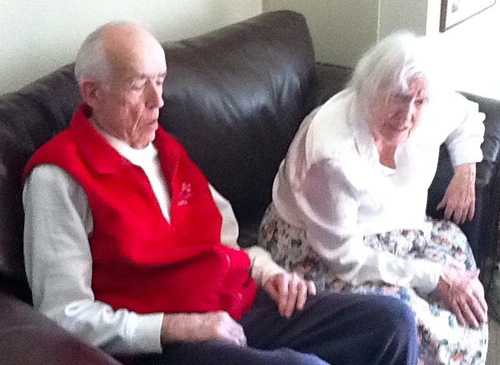
(Raven and Big Mama, October 2011. Photo Socotra.)
Copyright 2012 Vic Socotra
www.vicsocotra.com
Russians
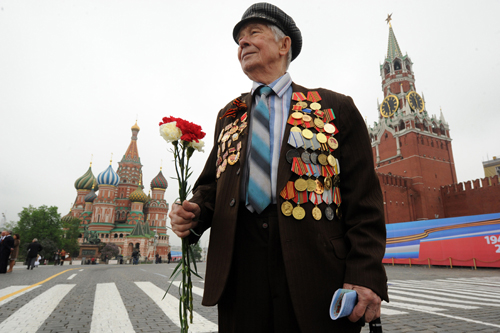
(A World War II veteran walks at the Red Square in Moscow, on May 9, 2012, after the Victory Day parade. Thousands of Russian soldiers marched today across Red Square to mark the 67 years since the victory over Nazi Germany in World War II. Photo Kirill Kudryavtsev/Agence/AFP/Getty Images)
I am messed up this morning. The antics of the alleged grown-ups continue apace, but I am going to do my best to avoid the whole political thing this week. Pandering to bases is not one of the things I want to dignify in this raw struggle for the future.
The celebrations had already happened in Moscow, where Marshall Zhukov road his white charger across the standards of the vanquished legions. Newly installed once-and-future President Vladimir Putin took the opportunity for some bombast to thousands of soldiers in Red Square.
Many pundits here have expressed concern that Mr. Putin is going to ramp up the rhetoric and boost military spending to put Russia back center stage in the world spotlight.
Chief of General Staff Nikolai Makarov said last week that Russia may consider a “pre-emptive strike” on the proposed missile defense system in Europe if the NATO project continues as planned. I think he ought to cool his jets a little bit. There will be plenty of flexibility on the rockets if the President is re-elected.
I have buried and hatchet, so to speak, and I did my best to honor Victory Day, Uncle Joe’s version of complete triumph over the Hitlerites. John-with-an-H insisted on calling it VE day, and that the anniversary was yesterday. I asked him to have a little respect for my Russian guests.
“My position is that while the Red Army might have mounted their Katusha rockets on Studebaker trucks, it was their soldiers who walked the long way to the Rhine against the Wehrmacht and the Waffen-SS.” I took a sip of happy Hour White and concluded: “we ought to remember the sacrifice. It meant a lot of American and British kids did not have to die.”
I had steeled myself to hobble around with the left leg bound tight in the brace and while I am paying for it this morning, it was worth it. I bought a couple beers for the Russians I know. Svetlana spent the afternoon at her doctor, eyes bathed in some sort of prophylactic, and she did not make it.
She is all American now, but like Lena-from-Vladivostok, was a young Komsomol and had the full experience of living in the USSR. I asked Maxim to come by too, since he is one of my subcontractors and has been wanting to get a meeting, and I figured it was two birds with one stone.
Maxim still carries himself with a little of the aura of a Post-Soviet man, his suits European-tailored and his accented words precise.
So, instead of three Russians, I had two. Maxim got out as soon as he could, once the Wall was down, though he still goes back to visit family. I noticed that he and Lena slipped back into Russian at the Willow bar, sitting between me and Old Jim.
I think there was a little resentment between them, Lena apparently viewing herself as one who stayed to mind the shop while those of weaker heart fled the wreckage of the Soviet system. I don’t know. I do know that I am grateful that nothing like what happened to the Russians has ever happened to us here in North America.
Even the carnage of the Civil War had nothing on what the beasts from Berlin did to them.
Of course, the Germans got back in spades what they dealt out over the 800 years of Teutonic advance to the east. Note to self: avoid living on vast sandy plains with no natural barriers. I like our oceans right where they are.
I dropped Lena at Macy’s where she could do some shopping- she was quite intent on that, and scored an iPod for her fifteen-year-old and was by no means done. I got back to Big Pink without incident, and wearily took off the leg brace once I was back in the unit and fairly confident I would not go down face-first on the floor.
Sleep was decent, the windows open and the sounds of the Arlington night were a comfort under the Eiderdown.
America is a pretty good place to live, wouldn’t you agree?
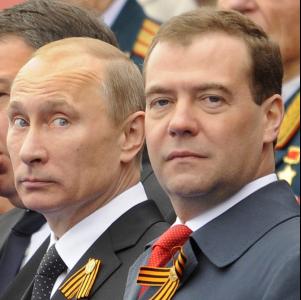
(Russian President Vladimir Putin and Prime Minister Dmitry Medvedev attend the Victory Day parade to on the Red Square in Moscow on May 9, 2012. Photo UPI.
Copyright 2012 Vic Socotra
www.vicsocotra.com
